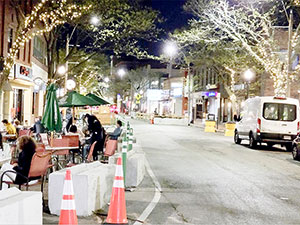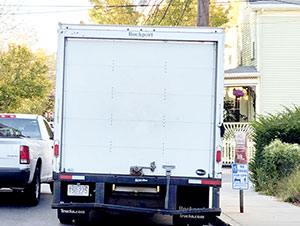
The city and consulting partners recently unveiled their Citywide Parking and Curb Use Study to at a public meeting.
By Luda Tang
Somerville city staff, along with the consultant team from Nelson Nygaard, a transportation planning firm, hosted a public meeting concerning the Citywide Parking and Curb Use Study on June 29.
The meeting provided much information to the public, with project manager Jason Novsam helping to audiences to clarify the project’s goals. In essence, the goal is to build a more sustainable, equitable, and accessible transportation network. By sharing curb inventory and occupancy data and results from outreach activities, Novsam made clearer the draft’s recommendations and the team’s next steps.
First, Novsam introduced some background information about the City of Somerville. The city now has 37 percent of residents driving alone, while 58 percent adopt the non-driving modes of transportation such as public transit, walking, biking, or simply working remotely.
However, even though non-driving modes account for the majority, the current allocation of curb space solely supports the driving mode. In other words, vehicle accessibility including short-term or long-term parking, pickup or drop-off is being prioritized.
 Yet other uses of the curb, like bike lanes, bus lanes, and travel lanes, have not been fully functional. In all neighborhoods of Somerville, the percentage of long-term vehicle storage far exceeds the other options, reaching more than 70 percent. Other uses of the curb have not even gone beyond 10 percent.
Yet other uses of the curb, like bike lanes, bus lanes, and travel lanes, have not been fully functional. In all neighborhoods of Somerville, the percentage of long-term vehicle storage far exceeds the other options, reaching more than 70 percent. Other uses of the curb have not even gone beyond 10 percent.
But SomerVision sets a goal of accomplishing 75% of non-driving modes in the future, which illustrates the importance of the reallocation of the current curb space in regards to other non-drivers’ needs.
To achieve that goal, the strategic parking management and mobility improvements need to be developed together. While the former helps with properly sized parking supplies, the latter reduces pressure on limited parking with other convenient alternatives provided to passengers.
The city now has 25,100 on-street parking spaces available, which comes to 0.3 spaces per capita. Through the field investigation, Novsam and his team found out that resident permit parking is 67% occupied on average overnight but with significant variability across districts.
For example, places like Hillside and Teele achieve 82 percent occupied spaces, but east Somerville may only have 61 percent of occupied spaces. Similar results are obtained for the parking investigation in some commercial areas, like Union Square, Davis Square, and Highland Avenue. The team discovered that 62 percent of Somerville’s public parking is occupied during the commercial peak period.
Time-limited parking, like the two-hour parking on Highland Avenue, is even higher. It achieves 67 percent occupancy during midday commercial hours. This number is much higher than the occupancy rate – 57 percent – of the nearby resident parking. Such high utilization explains why the commercial parking has been greatly valued by the community.
Even though the previous data shows only 37 percent of residents are driving alone, 76 percent of households own vehicles. Among 1,700 respondents of the following survey done by the team, 60 percent to 74 percent of respondents rely on cars to do grocery shopping, go to medical appointments, or run other errands.
These results from various researches lay the foundation of the draft recommendations. With the obvious insufficient accessible parking, the team thought it should prioritize the remaining parking space for high priority users, such as users with accessibility and mobility needs.
And yet, that is not considered to be enough. Considering the two facts that the curb spaces will be used more for non-parking users in the future, and that the existing curb spaces should also be accessed for businesses due to the growing business of delivery and ride-hail, increasing of the public parking supply is required. Besides that, to better manage parking demand, setting meter pricing based on results and revisiting the permit price structure can be helpful.
If community members want to provide more feedback, they can complete the online survey which will be released sometime in July, or they can leave comments in the project’s website comment box: https://voice.somervillema.gov/parking-study.












Reader Comments